'They can protest, but they cannot delay it'
 national |
environment |
feature
national |
environment |
feature  Tuesday February 14, 2006 16:11
Tuesday February 14, 2006 16:11 by Miriam Cotton
by Miriam Cotton
 A portent of all that was to follow on the discovery of gas off the Mayo coast must surely have been that all of the local SIPTU and other workers who had been involved in the exploration were immediately dropped. Foreign workers from the Phillippines and elsewhere were flown in and out from that point onwards - without ever touching Irish soil. Clearly, there was a determination to keep matters out of Irish hands from before the find - itself only a confirmation of what had long been known/suspected about our resrouces off the west coast (despite propaganda to the contrary that had been circulating in the years preceding the find).
A portent of all that was to follow on the discovery of gas off the Mayo coast must surely have been that all of the local SIPTU and other workers who had been involved in the exploration were immediately dropped. Foreign workers from the Phillippines and elsewhere were flown in and out from that point onwards - without ever touching Irish soil. Clearly, there was a determination to keep matters out of Irish hands from before the find - itself only a confirmation of what had long been known/suspected about our resrouces off the west coast (despite propaganda to the contrary that had been circulating in the years preceding the find).
 At the Maxwell lecture theatre, Hamilton Building, Trinity College on February the 9th, Eamon Dunphy together with Micheal O Sheigin of the Rossport Five was addressing an audience in advance of the Five's expected appearance in court today. Dunphy said he believed that what Charles Haughey and Ray Burke had done in relation to this issue amounted to treason. Against all the rules of public administration, they had met in secret, (i.e. without any other government representative present), with oil company representatives and had concluded a deal the details of which are still not known to this day. What is known is that the Irish people have no rights whatever to their own natural resources as a result of that deal. What is also certain is that on the very same day in January 1993 that subsequent legislation governing the issuing of exploration licences came into force, Enterprise Ireland applied for a license for the exploration of the Corrib field. Statoil, also on the same day, applied for four exploration licences. What amazing foresight they must have had - or perhaps they knew something the rest of us did not?
At the Maxwell lecture theatre, Hamilton Building, Trinity College on February the 9th, Eamon Dunphy together with Micheal O Sheigin of the Rossport Five was addressing an audience in advance of the Five's expected appearance in court today. Dunphy said he believed that what Charles Haughey and Ray Burke had done in relation to this issue amounted to treason. Against all the rules of public administration, they had met in secret, (i.e. without any other government representative present), with oil company representatives and had concluded a deal the details of which are still not known to this day. What is known is that the Irish people have no rights whatever to their own natural resources as a result of that deal. What is also certain is that on the very same day in January 1993 that subsequent legislation governing the issuing of exploration licences came into force, Enterprise Ireland applied for a license for the exploration of the Corrib field. Statoil, also on the same day, applied for four exploration licences. What amazing foresight they must have had - or perhaps they knew something the rest of us did not?
O' Sheigin said that it has been like living under martial law in Mayo in recent times - such were the restrictions placed on local people about what they can and cannot do with their own property. He quoted Frank Fahey who said
'they can protest, but they cannot delay'.
In this as in many other issues, the government is now expressly the enemy of its own electorate.
Two children of a family of fourteen - all of whom continue to live in the area - had been turned down for planning permission on the grounds that there was not enough soakage. The irony was apparently lost on the planners of citing this reason while at the same time granting permission for a 25 acre terminal in the same area whose soakage requirements would massively exceed those of two ordinary resdientail dwellings.
Speaking of the determination of the establishment to suppress opposition to the pipeline, O' Sheigin quoted the judge who in open court had told them "I'll take your house, I'll take your car, I'll take them from every farmer in Mayo if I have to'. The local bishops are trying to undermine support for them. RTE had banned the use of the term 'Rossport Five' althoug this had forced them to rely on using 'Shell to Sea' as an alternative, thereby creating some difficulty for themselves in their attempts to support the government line while while trying to find a form of wording that would not seem in any way to legitimise the protest. O' Sheigin said that Fianna Fail and Fine Gael were identically positioned where this issue was concerned. The Greens had formerly been supportive as had Sinn Fein, local Labour and others.
O' Sheigin and Dunphy gave an insightful talk focusing sharply on the toothlessness of the mainstream media on this and similar issues. Relating the history of events to date, O Sheigin gave a chilling account of how the local community in Mayo and the national interests had been so badly used and abused. He expressed his disappointment in Enda Kenny as a local TD and party leader whom he also described as 'an emotional bankrupt'. On pointing out to Kenny the fears that objectors to the pipeline had in view of the deaths of protestors in other countries, Kenny had remarked 'you can get shot here too - it only costs about five hundred to a thousand euros'.
Eamon Dunphy instanced what he called 'the killing of Frank Connolly' (previously described as a 'dangerous bastard' by Dermot Ahern) because of his exposure of Garda corruption in Donegal -among other things - as being the likely fate of any journalist trying to tell the truth about Ireland today. He pointed out that the Independent Media Group (for whom Dunphy works himself) was owned by Tony O' Reilly - also the owner of 'frontier'/exploration licences along the west coast. 'The 'killing' of Frank Fahey was a signal to other journalists', Dunphy said. Connolly was of course latterly reponsible for the Centre for Public Inquiry's independent report on the pipeline which concluded that it should not go ahead.
More insidious than media indifference and collusion was the extrarodinary inertia of Irish people. A representative of the Temple Bar residents group made the observation that 'the Irish people are comatose' and pointed out that the integrity of every aspect of Irish life was being seriously eroded by the constant undermining and avoidance of all forms of democractic accountability by the government - and yet people everywhere were turning a blind eye. The woman from Temple Bar thanked O Sheigin on behalf of everyone for the courageous stand they are taking against vested interests. The fact that only about 60 people attended the talk in the capital city of approx 2 million people was itself a disheartening fact, however. Eamon Dunphy suggested that people do more good than they know just by talking amongst their friends and personal contacts. He also pointed out that the general election was an event that could be used to give prominence to the issue. In that context, another audience member pointed out that Dublin City Council had banned the posting of political notices without so much as a murmur from the general population. Fianna Fail and the PDs are outlawing legitimate forms of public opposition.
By way of an indication of the governments attitude to this issue, O' Sheigin desribed attempts by the Irish government, against international law, to buy oil for control by private interests from Saddam Hussein some years ago. Saddam insisted to the Irish that he would only sell to an appropriate state organisation which the Irish were therefore forced to set up. But the Irish circumvented the requirement by restricting its remit to purchasing oil only - i.e. it would have no involvement in development or other matters. The government were determiend that all natural resources profit from them would stay in private hands. Additionally, and bizarrely, the government, by the introduction of Statutory Instrument 110, transferred responsibility for the Corrib field from the Dept. of Enterprise to the Dept. of the Evnironment (pal of Bertie's Frank Fahey was at the helm in the latter at the time). What unstated obligations are our govenment meeting and why?
Demolishing government/Shell/Statoil arguments about the safety of the line, O Sheigin pointed out how the vested interests continually mislead people on this matter. There were three issues that needed to be understood. Firstly, a PRODUCTION pipeline is not the same thing as TRANSMISSION pipeline. All of the figures on psi that the government and Shell etc are qutoing relate to transmission pipelines and even there the psi permissable (somewhere between 40 and 88 bar is the maximum allowed by Bord Gais) the gas is clean and relatively stable. The proposed pipeline could result in pressure up to 345 bar of volatile, unclean gas. Every independent assessment has concluded that this plan should not go ahead. An Bord Pleanala's original report had concluded that the pipeline 'should not happen under any circumstances'. O Sheigin told the audience that protestors wouldb e wrong to conclude that by backing away from changing legislation to expedite planning applications, the government had thought better. A much simpler and more effective means had been found: ABP has since been effectively neutered by the introduction of temproary contracts for all its inspectors (a practice common throughout the Irish state - where the hell are the unions on this one?) who now understand that a report that doesn't conclude what they government wants it to will mean they are out of a job. And to add insult to injury the government have recruited an oil industry agent whose website openly declares that his business to secure exploration and production rights on the best possible terms for oil companies, to provide an 'indpendent' report on the safety of the pipeline. It is a forgone conclusion that it will contradict all former, genuine, independent reports on the matter.
O' Sheigin also pointed out that the industry models are all based on pipes constructed of perfect steel. In reality there is no such thing: pipes are continually exploding. In Brussels, sixteen people died last year. In New Mixico people died 675' away when a 45 bar pipe exploded.